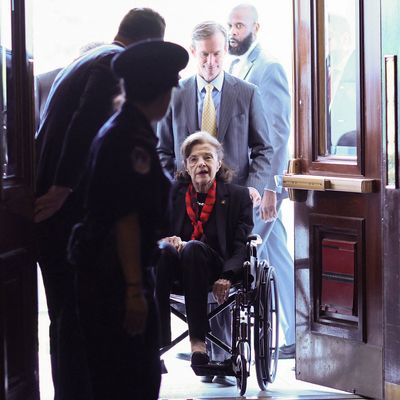
Senator Dianne Feinstein of California returned to the Senate on Wednesday, weeks shy of her 90th birthday. For nearly three months, she has been absent, the result of a serious case of shingles. Even now she can only work part time, she said in a statement released by her office. In photos that must double as proof of life, she looks fragile, stooped over in a wheelchair. That can hardly be how she’d like to be remembered. Yet as her long career in politics draws to a close, the senator is demolishing whatever legacy she’d hoped to leave. She has become a ghoulish spectacle and a warning: The system she represents is in trouble.
Feinstein’s fate condemns the very institutions to which she has dedicated herself. As Rebecca Traister noted in a 2022 profile, Feinstein participated enthusiastically in Supreme Court confirmation hearings for the conservative Amy Coney Barrett. “This is one of the best sets of hearings that I’ve participated in,” she told Senator Lindsey Graham at the time, and added, “It leaves one with a lot of hopes, a lot of questions, and even some ideas, perhaps some good bipartisan legislation we can put together to make this great country even better. So thank you so much for your leadership.” Months later, Barrett would cast a vote in favor of overturning Roe v. Wade. Though Feinstein cited Roe as a reason to oppose Barrett’s nomination, and voted against confirming her to the Court, her chumminess with Graham was out of keeping with the moment. It was as if the stakes eluded Feinstein.
Much eludes Feinstein these days. But there are still traces of the politician she has always been. Feinstein is an Establishment Democrat to her core. She has dedicated her adult life to the system we have, and she believes that it works, ultimately, toward justice. The country “goes through different phases,” she told Traister. “The institutions handling some of these issues have changed for the better. They’ve become more progressive, and I think that’s important.” A storm gathered, and Feinstein could not or would not see it. Whatever the case, she failed: Though she couldn’t have stopped Barrett’s ascension, she could have put up more of a fight. Why show someone like Graham an ounce of civility at all? Her long career might have sharpened her instincts. Instead, it seemingly desensitized her to danger. Her duty as a public servant was to sound the alarm, even if that was all she could do.
Feinstein leaves us now with no choice but to assume the worst about her motivations. Her failure to retire — and before that, her decision to run for reelection despite her advanced age — can be chalked up to arrogance. She believes the system works because it first worked for her. She climbed the ranks, achieved high office, and stayed there. Lifted to such a vantage, a person has two choices. They can look outward, survey the American landscape in its full, broken reality, and act in accordance with what they see. Or they can disappear into the same institutions that elevated them to power. Feinstein chose the latter. The climate activists she once ridiculed tried to get her to choose another path, but she did not listen. Here we stand, then, in the ruins of Feinstein’s career, in what might also be the ruins of the American experiment itself.
Feinstein’s fate is tragic. The woman in the wheelchair may remind us of our own grandmothers, nearing the end of their long and complicated lives. Her familiarity, however, should not blind us to the implications of her situation. The system is dysfunctional in part because of politicians like Feinstein: men and women who choose personal gratification over public service. Our norms and institutions are not working, at least not for anyone outside the Senate. They are due for transformations that might dismay Feinstein, who seems to believe they would evolve naturally over time.
Yet time itself is short. As the far right gathers strength, it threatens democracy, and our ruling gerontocracy has little to say. Feinstein is becoming a symbol of catastrophic personal failure, but the problem is widespread. Consider Senator Dick Durbin, a Democrat from Illinois, age 78. As the chair of the Senate Judiciary Committee, his response to Justice Clarence Thomas’s almost-cartoonish levels of corruption has been to place his trust in Chief Justice John Roberts. “This is the Roberts Court,” Durbin told CNN’s Jake Tapper. “History is going to judge him by the decision he makes on this. He has the power to make the difference.” History will judge Durbin and Feinstein and the rest of them, too.
“Where am I going?” Feinstein was heard asking on Wednesday. The same place as the rest of us, Senator. Right now, it’s nowhere good.






























